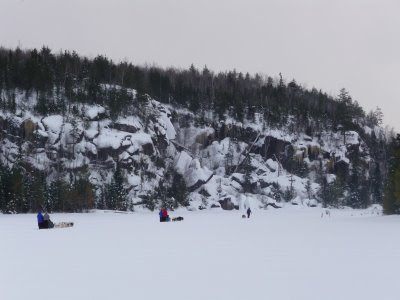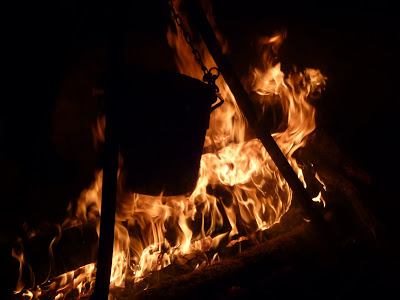
Guest Blogger: The following photos and text are by Wilderness Guide LynnAnne Vesper. Jason is guiding a dogsled camping trip this week.
I was so cold last night! I just couldn’t warm up in my sleeping bag. I thought, ‘How am I going to survive this trip if I am such a weenie?’
Around the morning campfire, in the first rays of sunlight, the stories spilled out. Everyone shared their challenges of the previous night, our first night on the trail. We felt well-rested, and after a hearty breakfast of steel cut oats and flax, we were ready to take on the challenges of dog sledding up to beautiful Knife Lake. But we all knew that our first night had been exceptionally cold. We wouldn’t know how cold it had been until we got home.

One evening, LynnAnne found a “dead and down” old, dry white pine trunk. Full of sap, it nearly engulfed the water pot in flames.
People who sign up on Wintergreen Advanced Camping Trips do not expect to lie on a beach lounger sipping pina coladas. They accept, by and large, that winter camping brings with it exceptional challenges, both physical and mental. It also has its rewards.
Why do we do this? I put this question to a couple of seasoned veterans, alumni of several of Wintergreen’s most extreme trips, including Wintergreen West dog sledding in the Rocky Mountains. Here is what they said:
When you go on these expeditions, you get to places that other people don’t
go. You see things that other people will never see.
Travel by dogteam is such a rare opportunity. Anyone can get a backpack
and explore the wilderness on foot.
The dogs are so excited to go, and their enthusiasm is contagious.
Winter camping seems so improbable, like an oxymoron. You cannot camp in the winter and have it your way. You learn to accept the weather on her own terms, and you learn to adapt. The wilderness is a teacher, and we are the students. The wilderness must be accepted as a whole. We can take in the beautiful scenery because we have worked together to get there.
Likewise, we also have to accept ourselves and each other as whole people. People are people; we have to take the characteristics we like about other people together with those characteristics we would rather leave by the side of the trail. Modern people spend so much of their lives seeking comfort. Like Goldilocks, we gravitate toward not too hot and not too cold, toward just right. Although we consider ourselves disciplined, we avoid adversity. A winter camping trip is an opportunity to face adversity, to push our personal limits of what we think we are capable.
When we got home, we learned that the temperature on our first night was -37 at the lodge. At low points in the trail, it can be a few degrees colder. But we should consider ourselves lucky. It could have rained.




It could have RAINED? At 37 below?! Seriously though, I know what you mean. Rain at 37 above is totally absolutely miserable.
That first photo is from the south end of Wisini, is it not?
As for the rest – very well put 😉
Well said, LynnAnne. I’m proud of the way that our group pulled (and pushed!) together in the face of the physical and mental challenges that we faced on that trip – particularly the youngest members of the group, who did far better than I would have at their age. I hope that your group found the experience as rewarding as we did.
Betsy, the rain comment by LynnAnne is probably directed at me. I led a camping trip recently with three days of rain. About once each winter we get hit with some warm temps and wet precip. I just happened to be camping this time around.
Brossa, hopefully LynnAnne may comment and confirm the location of the pic of the cliffs.
J Estes, congrats to you and the other group on a successful winter camping adventure!
The first photo is indeed on Wisini lake, the highest and in my opinion the most beautiful lake on our route.
Uff da, Jason Z! I don’t think anyone wanted to be in your shoes with the weather you encountered on your pole shake-down trip.
Jason E – We never would have been able to do this route without you guys in front of us. Camping with Paul always has its special rewards.